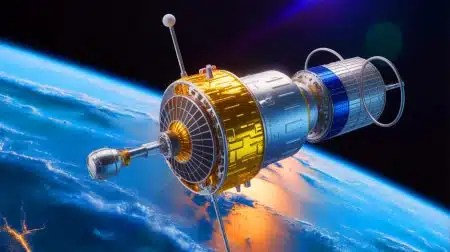| IN A NUTSHELL |
|
Rocket Lab, a burgeoning competitor to SpaceX, is making significant strides in the aerospace industry with its innovative Neutron rocket. Scheduled for its inaugural flight in late 2025, Neutron has already secured a critical mission with the United States Air Force. This collaboration represents a significant advancement for Rocket Lab, indicating a potential shift in military logistics through space. As the company expands its capabilities from its successful Electron rocket to the more ambitious Neutron, it aims to carve out a niche between smaller launch vehicles and larger giants like the Falcon 9.
Neutron: The Next Step in Reusable Rockets
Rocket Lab, originally from New Zealand and now firmly established in the United States, is stepping up its ambitions with Neutron, a medium-sized, partially reusable launch vehicle. Standing at 43 meters tall and capable of carrying 28,660 pounds into low Earth orbit, Neutron aims to fill the gap between smaller rockets like Rocket Lab’s own Electron and larger vehicles like SpaceX’s Falcon 9. The ingenuity of Neutron lies in its first stage, equipped with nine in-house designed Archimedes engines, which is designed to be reusable.
The separation system between the stages is particularly noteworthy. It features a fairing that opens like a hippo’s jaws, allowing the second stage to be released while keeping the first stage intact for future use. This innovative approach ensures cost optimization and increased launch frequency, key advantages for government contracts and commercial customers alike. The company has even devised a floating landing platform humorously named “Return on Investment,” to recover the first stages at sea, similar to SpaceX’s recovery strategy.
Partnering With the US Air Force: A New Frontier
The spotlight on Neutron brightens with its selection by the US Air Force Research Laboratory for an unprecedented project. If all goes according to plan, the rocket will take part in a test mission in 2026 under the REGAL initiative (Rocket Experimentation for Global Agile Logistics). This program explores the potential for rapidly delivering military equipment anywhere on Earth via space. The goal is to test the resilience of cargo during atmospheric reentry and assess Neutron's capabilities for ultra-fast point-to-point transport.
The vision is to create a future where a satellite, drone, or critical parts can be launched and retrieved within hours, reaching remote areas of the globe. This rapid logistics capability is reminiscent of Amazon's express delivery but for military purposes. The success of this initiative could redefine how logistics are managed, offering unprecedented speed and flexibility.
Aliens May Be 33,000 Light-Years Away: Scientists Warn of Possible Life Beyond Our Galaxy
A Vote of Confidence With Significant Implications
This contract with the Air Force is more than just a test flight; it is a strong endorsement of Rocket Lab's technology by US authorities. As Peter Beck, CEO and founder of Rocket Lab, emphasizes, "Neutron will set a new standard for performance, accessibility, and reliability for government and commercial missions." The timing is also telling; the REGAL mission is set to occur right after Neutron's initial test flights, scheduled for late 2025.
If successful, Rocket Lab could join the exclusive circle of space providers capable of meeting the stringent demands of the US Department of Defense. This alignment with military objectives not only enhances the company's credibility but also positions it favorably in securing future contracts in an industry where every deal is worth millions, if not more.
The Intensifying Race for Reusable Rockets
With Neutron, Rocket Lab is positioning itself in the new space era, where reusability equates to profitability. What was once a daring gamble a decade ago—returning an entire rocket for relaunch—is now an essential standard for staying competitive. Companies like Blue Origin, Relativity Space, and even Europe with Ariane Next are striving to align with this model.
Unlike SpaceX, which has its sights set on Mars, Rocket Lab seems to be targeting a more specific market: medium-capacity launches at high frequency. This niche, coupled with versatility, appeals to both space startups and military clients. By focusing on this segment, Rocket Lab differentiates itself from its competitors and capitalizes on its strengths in precision and adaptability.
Anticipation Builds as Launch Approaches
Testing is ramping up, with videos, engine images, and upper-stage deployments being shared regularly. Rocket Lab is maintaining a steady stream of communication, heightening anticipation around Neutron. By partnering with the US Air Force, the company secures more than just a marketing coup; it gains invaluable strategic credibility in an industry where each contract can be worth millions—and sometimes much more. The question remains: as Rocket Lab inches closer to its first Neutron launch, how will this ambitious endeavor reshape the landscape of military and commercial space logistics?
Did you like it? 4.5/5 (24)








Is it just me, or does this sound like something out of a sci-fi movie? 🤔
Wow, a rocket named “Return on Investment”! 😂 That’s a great sense of humor, Rocket Lab!
How does this system compare in cost to traditional cargo delivery methods?
Wow, Rocket Lab is really stepping up their game! Can’t wait to see the first launch. 🚀
Is this more about military logistics or a step towards commercial space travel?
How does this compare to SpaceX’s capabilities? Are they really beating them?
So, who exactly is winning here, Rocket Lab or the Pentagon? 🤔